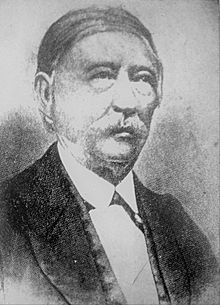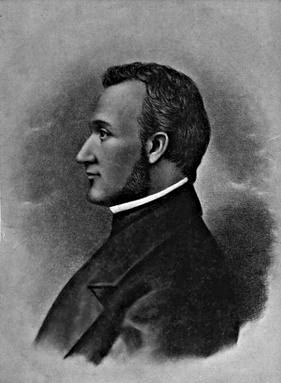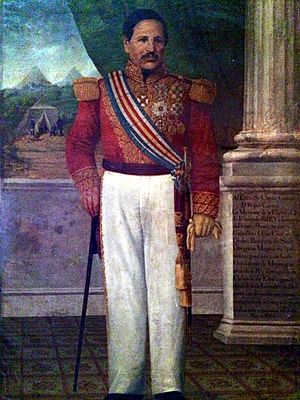Doroteo Vasconcelos facts for kids
Quick facts for kids
Doroteo Vasconcelos
|
|
|---|---|
 |
|
| President of El Salvador | |
| In office 7 February 1848 – 26 January 1850 |
|
| Vice President | José Félix Quirós |
| Preceded by | José Félix Quirós |
| Succeeded by | Ramón Rodríguez |
| In office 4 February 1850 – 1 March 1851 |
|
| Vice President | José Félix Quirós |
| Preceded by | Ramón Rodríguez |
| Succeeded by | Francisco Dueñas |
| Personal details | |
| Born | 6 February 1803 Sensuntepeque, El Salvador Province, Capitanía General de Guatemala, Spain |
| Died | 10 March 1883 (aged 80) San Vicente, El Salvador |
| Political party | Liberal |
| Occupation | Military |
Doroteo Vasconcelos Vides y Ladrón de Guevara (born February 6, 1803 – died March 10, 1883) was an important political leader in El Salvador. He served as the President of El Salvador two times. His first term was from February 7, 1848, to February 1, 1850. He then served again from February 4, 1850, to March 1, 1851.
Vasconcelos was a close friend of the famous Honduran general, Francisco Morazán. He was a strong supporter of liberal ideas in Central America. He tried to unite Central American countries under a federal government. This led him to challenge General Rafael Carrera of Guatemala. Vasconcelos's forces were defeated in a major battle in 1851. After this loss, he decided to leave public life.
Contents
Early Life and Political Beginnings
Doroteo Vasconcelos was born in Sensuntepeque, which is now part of El Salvador. He was born when Central America was still under Spanish rule. He grew up during a time of big changes and independence movements. Vasconcelos became a military man and later a politician. He believed in liberal ideas, which supported more freedom and a federal system for Central American countries.

Supporting Los Altos
In 1848, there was a lot of political trouble in Guatemala. The liberal leaders managed to make Rafael Carrera leave his position. Carrera went to Mexico for a while. During his absence, liberals in Quetzaltenango declared that their region, called Los Altos, was an independent state again. This happened on August 26, 1848.
President Vasconcelos in El Salvador supported this new independent state. He also supported rebel groups who were against General Carrera. However, Carrera soon returned to Guatemala. He gathered support from native communities. He managed to regain control of the region. This showed that Carrera was still a very powerful figure.
Vasconcelos and other liberal leaders hoped to bring back a federal government in Central America. They saw Carrera as a major obstacle to this goal.
Second Term as President
After his first term, Vasconcelos briefly handed power to Ramón Rodríguez. But just a few days later, Vasconcelos became president again for another two years.
During his second term, Vasconcelos honored his old friend, Francisco Morazán. He ordered Morazán's remains to be brought back to El Salvador. Morazán was buried with full state honors.
Vasconcelos also offered safety to Guatemalan liberals who had been forced to leave their country by Carrera. This caused more tension between El Salvador and Guatemala.
The Battle of La Arada

After Rafael Carrera returned to power in Guatemala in 1849, Vasconcelos continued to support Guatemalan liberals. He provided them with money and weapons. By late 1850, Vasconcelos decided it was time for a direct attack on Guatemala. He invited Honduras and Nicaragua to join him in an alliance. Only the Honduran government, led by Juan Lindo, agreed.
On January 4, 1851, Vasconcelos and Lindo met in Ocotepeque, Honduras. They signed an agreement to fight against Guatemala. The Salvadoran army had 4,000 well-trained soldiers. The Honduran army had 2,000 soldiers. Their combined army gathered in Metapán, El Salvador. This location was close to both the Guatemalan and Honduran borders.
On January 28, 1851, Vasconcelos sent a letter to Guatemala. He demanded that the Guatemalan president step down. He also wanted Rafael Carrera to be sent out of the country. Guatemala refused these demands.
The Allied army then entered Guatemala from three different points. The main force of 4,500 men was led by Vasconcelos himself. Other important commanders included General José Santos Guardiola and General José Trinidad Cabañas. Guatemala had about 2,000 men, led by Lieutenant General Rafael Carrera.
The Battle Begins
Carrera's plan was to pretend to retreat. He wanted the enemy to follow his troops to a place he had chosen. On February 1, 1851, both armies faced each other across the San José river. Carrera had fortified a hill called La Arada. This hill was about 50 meters (164 feet) above the river. There was a meadow and a sugar cane field between the hill and the river.
Carrera divided his army into three parts. He led the central part, where his artillery was placed. Five hundred men stayed in Chiquimula to defend the city and help if a retreat was needed. This left only 1,500 Guatemalan soldiers to face 4,500 Allied soldiers.
The battle started at 8:30 AM. The Allied troops attacked at three different points. The first attacks were pushed back by the Guatemalan defenders. During the third attack, the fighting became very close.
At a critical moment, Carrera ordered the sugar cane field to be set on fire. This trapped the invading army. They faced fierce Guatemalan fire from the front. On their sides, there was a huge fire. Behind them was the river, making retreat very difficult. The central part of the Allied army panicked and started to run away. Soon, all the Allied troops were retreating.
The Guatemalan soldiers chased the fleeing Allied army. The Allied forces suffered heavy losses. They had 528 dead, 200 prisoners, and lost many weapons and supplies. Vasconcelos escaped to El Salvador.
After this major defeat, Vasconcelos decided to retire from both the presidency and public life.
Images for kids
Error: no page names specified (help). In Spanish: Doroteo Vasconcelos para niños
In Spanish: Doroteo Vasconcelos para niños
 | Mary Eliza Mahoney |
 | Susie King Taylor |
 | Ida Gray |
 | Eliza Ann Grier |


